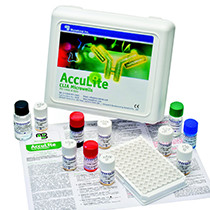|
|

Follicle Stimulating Hormone (FSH) is made by the pituitary gland in the brain. Control of FSH production is a complex system involving hormones produced by the gonads (ovaries or testes), the pituitary, and the hypothalamus.
In women, FSH stimulates the growth and maturation of ovarian follicles (eggs) during the follicular phase of the menstrual cycle. This cycle is divided into two phases, the follicular and the luteal, by a mid-cycle surge of FSH and luteinizing hormone (LH). Ovulation occurs shortly after this mid-cycle surge of hormones. During the follicular phase, FSH initiates the production of estradiol by the follicle, and the two hormones work together in the further development of the egg follicle. During the luteal phase, FSH stimulates the production of progesterone. Both estradiol and progesterone help the pituitary control the amount of FSH produced. FSH also facilitates the ability of the ovary to respond to LH. At the time of menopause, the ovaries stop functioning and FSH levels rise.
In men, FSH stimulates the testes to produce mature sperm and also promotes the production of androgen binding proteins. FSH levels are relatively constant in males after puberty.
In infants and children, FSH levels rise shortly after birth and then fall to very low levels (by 6 months in boys and 1-2 years in girls). At about 6-8 years, levels again rise before the beginning of puberty and the development of secondary sexual characteristics.
READ MORE
AccuBind® ELISA

Available Materials
Item
Description
Price
Qty
Order
Product Specs
Method:
Enzyme Immunoassay, Colormetric
Principle:
Sandwich Assay, Streptavidin-Coated Plate
Calibrators:
0, 5, 10, 25, 50, 100 mlU/ml (2nd IRP 78/549)
AccuLite® CLIA

Available Materials
Item
Description
Price
Qty
Order
Product Specs
Method:
Enzyme Immunoassay, Chemiluminescence
Principle:
Sandwich Assay, Streptavidin-Coated Plate
Calibrators:
0, 5, 10, 25, 50, 100 mlU/ml (2nd IRP 78/549)
Sensitivity:
0.084 mIU/ml
|
|
|